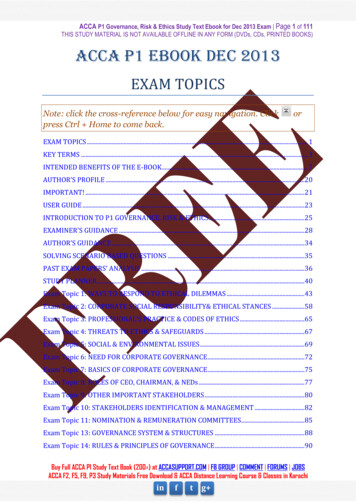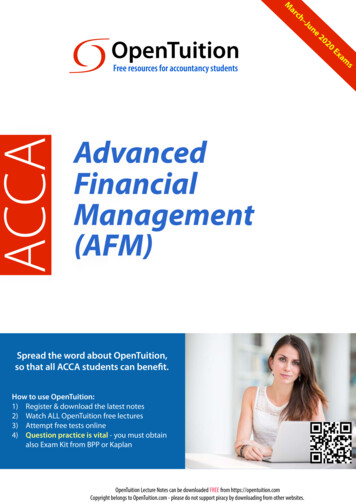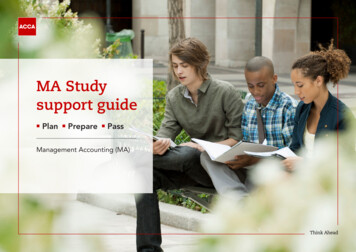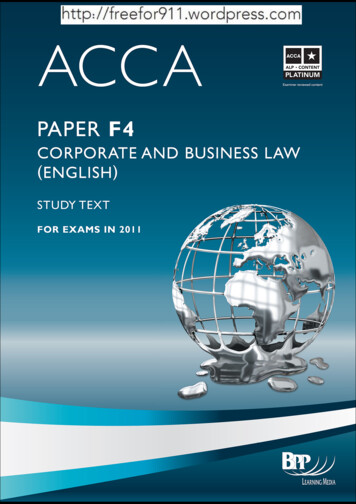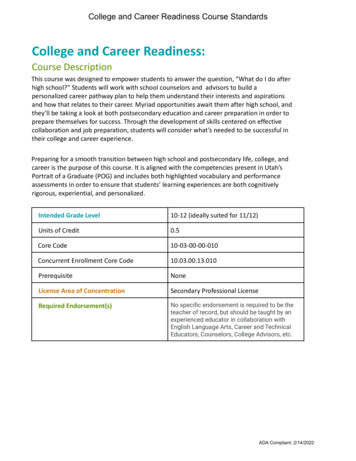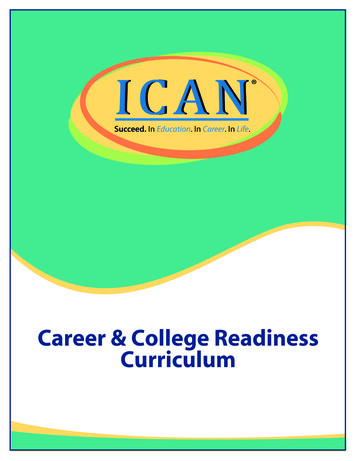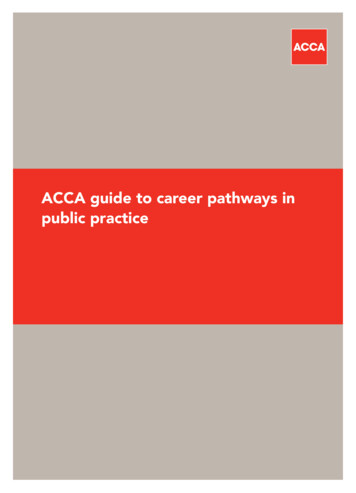
Transcription
ACCA guide to career pathways inpublic practiceCareer pathways in publ#CA.indd 114/08/2009 12:14:24
ContentsFOREWORD3Introduction4using the guide51 ACCA in public practiceThe ACCA QualificationSummaryThe nine domains of competenceThe exam syllabusExperience requirementsEthicsCPD66688892 Careers in public practice: audit, tax and advisoryAuditIntroductionCareer pathway in auditRoles and responsibilities in auditTechnical competences in auditBusiness skills and behavioural competences in audit999101112TaxIntroductionCareer pathway in taxRoles and responsibilities in taxTechnical competences in taxBusiness skills and behavioural competences in tax131313131415AdvisoryIntroductionCareer pathway in advisoryRoles and responsibilities in advisoryTechnical competences in advisoryBusiness skills and behavioural competences in advisory1616161617173 Choosing the right pathwayMobility in public practiceTracking progress along the career path18202Career pathways in publ#CA.indd 214/08/2009 12:14:24
ForewordAs part of our efforts towards building world class talents to support the public practice, weare supportive towards implementation of the right career pathway for accounting affiliates andmembers.A strong and vibrant public practice is important in the development of strong CPA which is anessential part of the capital market supply chain. This is necessary to ensure public trust – a keysuccess factor towards building business confidence.In today’s fast changing world, driven by rapid change in business models, consumer demands,the public practice is not spared from the need to change and align to business realities.Individuals seeking to succeed in the world of public practice will need to be re-skilled to remainrelevant to clients and consistently deliver their value propositions successfully.The world of public practice is one that is diverse and requires different skill sets, aptitudes andcompetencies. It is also important that practitioners leverage on their core competencies andclearly define the service lines across public practice they feel they will do best in, be it audit, taxor advisory.At the same time, the new generation Y employees are demanding greater clarity in the work theyare empowered, the standards they are employed to perform and the flexibility they want fromtheir career growth.A career in public practice can be the first step to a world of possibilities, career opportunitiesand personal development. It is a world where professionals hit the ground running, using theirfinancial skills, technical knowledge and insights to help clients understand and meet evolvingfinancial reporting standard and regulations in an increasing complex business environment. Thisis vital to building and maintaining the credibility of independent reporting in today’s corporate world.It is with this in mind that ACCA has launched the ACCA guide to career pathways in publicpractice as a tool and resource to provide guidance for those seeking to pursue a career inpublic practice as well as help professionals already in this business arena to keep pace with thedevelopments.This guide has been designed to provide both aspiring and current public practitioners with aframework to effectively structure and develop their careers in public practice. It also gives greaterclarity on the job scopes, activities and necessary competencies for individuals as they progress intheir careers. Greater guidance is also given on the potential mobility of qualified accountants bothwithin the profession and also externally to the wider business community.For the employers it provides a road map to chart the careers of their future leaders, as wellensuring their directions, supported by the right mentoring and development infrastructures, forwhich this guide is meant for.The development of a flourishing public practice sector must also be underpinned by a robustprofessional qualification and training and this guide demonstrates how the ACCA qualificationprovides a sound framework that ensures ACCA members are not only ‘fit for business’ but arealso ‘fit for the future.’ACCA is delighted to support the public practice profession through this timely and useful tool andgive both future and current accountants an edge in their professional and personal developmentas they seek to scale even greater heights!TAY KAY LUANACCA DirectorASEAN and Australasiacareer pathways in public practiceCareer pathways in publ#CA.indd 3Contents314/08/2009 12:14:24
IntroductionThis guide is a quick reference for anyone interested in pursuing a career in public practice. It isalso very useful for individuals already working in the sector, in any size of firm, and consideringtheir next career move.It has been developed to assistindividuals in providing a structuredmethod to planning and managing theircareers in the sector so they can beginto answer questions like: Is a job inaudit right for me? Am I likely to enjoya career in tax? What are my options inmoving within the sector? Can I moveoutside into the wider accountancy orbusiness field? What are the skills andknowledge I would need to develop?“It is interesting and more than justinteresting. As an audit professional youare privy to the workings of a company.You can learn a lot of things you wouldn’totherwise have had a chance to.”senior manager, big four“I love the fact that when I joined, I joinedwith a group of people my own age.You build strong relationships as mostassignments are carried out in teams”it easier to change career direction?Finally, it introduces the individualto ACCA’s online global competencetool – ACCA Compass, which enablesindividuals to track progress againsttheir career paths and to target futureroles by better understanding the skillsand knowledge they would need todevelop.The information in the guide wasdeveloped through research, interviewsand surveys of professionals andIt starts by providing an overviewnew joiner in a public practicepractitioners in audit, tax and advisoryof how the ACCA Qualificationas well as discussions with ACCAdevelops the competences and skillsmember firms. Their insights and opinions on career paths,that employees in the sector require. It goes on to explore thecompetences and job roles were then compiled into the guide.three key service lines typically found in many public practiceorganisations – audit, tax and advisory, explaining the typicalWe hope that the information in this document serves toroles and responsibilities of professionals at different careerassist in making important career decisions. It should help instages and roles, and the related competences that should beidentifying and guiding professional development requirements,developed to be successful at each stage. It also considers theand provide greater certainty and understanding for individualsissue of career mobility both within the sector, and outside in theabout future career options so that they may enjoy a successfulwider business environment – what are the roles or service linesand rewarding career.that provide most career flexibility, and at what career levels is4Career pathways in publ#CA.indd 414/08/2009 12:14:24
Using the guideACCAmembershipLearn about how the ACCAQualification has beendeveloped to be appropriate toroles across public practice.ExamsEthicsExperienceAverage yearsof experience10–15Manager4–6Executive senior2–3Senior associatensiores5–7rogSenior managerrp6–8reeExecutive director9–12CaUnderstand more about thedifferent service lines acrosspublic practice. Read about theroles, key responsibilities, andskills required, and review thedifferent career paths individualscan take.Seniorexecutivedirector/partnerAssociateModel AThe audit career pathway in the Big Four and medium sized firmsTrack progress in your career pathby using ACCA’s new competenceassessment tool, ACCA Compass.career pathways in public practiceCareer pathways in publ#CA.indd 5USING THE GUIDE514/08/2009 12:14:24
ACCA in public practiceThe ACCA QualificationACCA has a clear understanding of, and strong commitment to,the needs and aspirations of accountants in public practice. Over35,000 ACCA members are employed in the public practicesector, in small and medium sized practices through to the BigFour accounting firms.ACCA offers qualifications which allow students and members tofocus on education and training that is highly relevant for a moderncareer in public practice. The ACCA Qualification has been designedas a business relevant, first choice qualification for those seekinga rewarding career in accountancy, finance and management. Asthe international leader by size in 47 markets, ACCA is uniquelyplaced to provide employers with a globally recognised andportable qualification for accountants in public practice.The ACCA Qualification has been designed to provideaccountants in public practice with the relevant capabilitiesand competences they need as identified by members and keyemployers. It is designed not only to ensure that ACCA membersare immediately ‘fit for business’ as fully contributing employees,but that they are ‘fit for the future’ and possess the capabilitiesto add real value to their organisations and have the aspirationsand potential to accept high levels of responsibility and to carryout the most senior roles in public practice.The ACCA Qualification is flexibly designed to allow studentsto select particular combinations of exams and work-basedpractical experience that are specifically tailored for theirwork, particularly those within public practice. This bookletexplains how the ACCA Qualification can be shaped to supportcareers in the public practice field across three key service areas– audit, tax, and advisory.A summary of the ACCA QualificationThe ACCA Qualification comprises three components:Professionalismethics ssPerformancemanagement andmanagementaccountingFinance andfinancialmanagementFinancialaccountingand reportingTaxationAudit andassuranceBusiness andcommercial lawProfessionalism, ethics and governance: this tests and developsthe appropriate ethics, values and standards of behaviour,including the requirement to comply with legal, regulatory andsocial requirements, as well as developing a good understandingof risk management principles and processes.Business management: this tests skills and knowledge in relationto project management and managing others – for example,directing the work of others, monitoring and managing progressand quality of work, driving improvements through change andinnovation, and providing leadership towards meeting specificassignment goals.Personal effectiveness: includes those competences associatedpersonal skills, such as communicating effectively, interacting andbehaving appropriately with colleagues and others, committingto personal learning and development, self management andeffectively using information and communications technology.Performance management and management accounting: thistests the knowledge and skills in relation to the applicationof management accounting techniques, financial planning.budgeting and decision making, and performance evaluationand controlACCAmembershipFinance and financial management: this tests skills andknowledge in investment analysis and appraisal, andbusiness financingExamsTo EthicsExperiencequalify as an ACCA member, trainees must:pass all examinations – there are 14 paperscomplete the Professional Ethics modulecomplete ACCA’s practical experience requirements (PER).The nine domains of competenceThe design and content of the ACCA Qualification is derivedfrom extensive consultation and with reference to best practicein professional education and training, and in accordance withthe International Federation of Accountants (IFAC) standards.ACCA has identified nine domains of competence relevant forprofessional accountants working in public practice covering itsexams and experience requirements.Financial accounting and reporting: focuses on statutoryaccounting requirements, and developing skills and knowledge inkey financial reporting areas, preparing and interpreting financialtransactions and statementsTaxation: this tests skills and knowledge across the rangeof corporate, indirect and personal tax issues. It involvesunderstanding the full range of computation, planning andreporting issuesAudit and assurance: Develops skills and knowledge across theentire audit cycle, and ensures competence is developed in allauditing areas.Business and commercial law: Ensures competence is developedin all regulatory aspects.6Career pathways in publ#CA.indd 614/08/2009 12:14:24
A ACCA in public practiceThe nine domains of competence bring together ACCA’s exams and experience requirements so that examinations and performanceobjectives can be aligned which means that public practice trainees can see how the knowledge developed through study links tothe workplace.Benefits of linking exams and experience: Putting into practice in the workplace techniques and theories learnt via the exams Higher exam success rates and faster progression to ACCA.Professional ethics andgovernanceBusiness managementPersonal effectivenessF1, P3PO: 7, 8, 9F1PO: 4, 5, 6Performance managementand management accountingFinance and financialmanagementFinancial accountingand reportingF2, F5, P5PO: 12, 13, 14F9, P4PO: 15F3, F7, P2PO: 10, 11TaxationAudit and assuranceF6, P6PO: 19F8, P7PO: 17Business andcommercial lawF1, P1PO: 1, 2, 3ExaminationsF1, Accountant in BusinessF2, Management AccountingF3, Financial AccountingF4, Corporate and Business LawF5, Performance ManagementF6, TaxationF7, Financial ReportingF8, Audit and AssuranceF9, Financial ManagementP1, Professional AccountantP2, Corporate ReportingP3, Business AnalysisP4, Advanced Financial ManagementP5, Advanced Performance ManagementP6, Advanced TaxationP7, Advanced Audit and AssuranceF4 and across all POsExperience – Performance ObjectivesPO1 Demonstrate the application of professional ethics, values, and judgementsPO2 Contribute to the effective governance of an organisationPO3 Raise awareness of non financial riskPO4 Manage selfPO5 Communicate effectivelyPO6 Use information and communications technologyPO7 Manage ongoing activities in your area of responsibilityPO8 Improve departmental performancePO9 Manage an assignmentPO10 Prepare financial statements for external purposePO11 Interpret financial transactions and financial statementsPO12 Prepare financial information for managementPO13 Contribute to budget planning and productionPO14 Monitor and control budgetsPO15 Evaluate potential business/investment opportunities and required finance optionsPO16 Manage cash using active cash management and treasury systemsPO17 Prepare for and collect evidence for auditPO18 Evaluate and report on auditPO19 Evaluate and compute taxes payablePO20 Assist with tax planningcareer pathways in public practiceCareer pathways in publ#CA.indd 7ACCA in public practice714/08/2009 12:14:25
ACCA in public practiceAThe Exam SyllabusACCA’s examination syllabus contributes directly to thedevelopment of skills and knowledge that accountants in allpublic practice roles require. Students are required to complete14 papers in total as follows:Fundamentals Knowledge module – three papersThe Knowledge module introduces public practice trainees tocore accounting concepts across business, providing them withbasic understanding of finance principles and techniques.F1, Accountant in BusinessF2, Management AccountingF3, Financial AccountingFundamentals Skills module – six papersThe Skills module builds on the knowledge module, exploringin more depth six core technical accounting areas that anyaccountant in public practice, regardless of their particularservice area should be technically proficient in.F4, Corporate and Business LawF5, Performance ManagementF6, TaxationF7, Financial ReportingF8, Audit and AssuranceF9, Financial ManagementProfessional Essentials module – three papersThe Essentials module provides public practice trainees withthe in-depth understanding they will need as they progress theircareers in public practice. The papers introduce the trainee toapplying knowledge and professional judgement across a numberof key areas, including corporate governance, internal control,compliance, risk management, statutory finance reporting andstrategic business issues.P1, Professional AccountantP2, Corporate ReportingP3, Business AnalysisProfessional Options module – two papersThe Options module allows trainees to select two optional papersfrom a choice of four. Trainees in public practice are usuallyrecommended to take P6 and P7 papers which require thetrainee to apply relevant knowledge and professional judgementto tax and auditing issues.P6, Advanced TaxP7, Advanced Audit and AssuranceVisit www.accaglobal.com for further information on ACCAexamination syllabus.Experience RequirementsACCA’s practical experience requirement is a key component ofthe ACCA Qualification. To become ACCA members all traineesmust also gain relevant practical experience. In order to performeffectively as an ACCA-qualified accountant in public practice,and to help future career challenges, individuals need to developtheir skills in the workplace.All ACCA’s need to have achieved 13 performance objectives(nine essentials and four options) and at least 36 months’ worthof relevant practical experience.Performance objectives are benchmarks of effectiveperformance that describe the types of work activity in whichtrainees will be involved.EssentialsCover the general business, management and personaleffectiveness skills that accountants in public practice must beable to demonstrate. All of these performance objectives need tobe acquired by the trainee.PO1 Demonstrate the application of professional ethics, values,and judgementsPO2 Contribute to the effective governance of an organisationPO3 Raise awareness of non financial riskPO4 Manage SelfPO5 Communicate EffectivelyPO6 Use information and communications technologyPO7 Manage ongoing activities in your area of responsibilityPO8 Improve departmental performancePO9 Manage an assignment.OptionsCovers the other technical and accounting finance domains ofcompetence within the ACCA Qualification. ACCA recommendscompletion of Performance Objectives 17–20 for those traineesworking in public practice as they are tax and audit focused.PO17 Prepare for and collect evidence for auditPO18 Evaluate and report on auditPO19 Evaluate and compute taxes payablePO20 Assist with tax planningVisit www.accaglobal.com for further information on ACCA’spractical experience requirements.EthicsAll ACCA trainees are required to complete a Professional EthicsModule as part of completing the ACCA Qualification. The modulegives trainees exposure to a range of ethical perspectives. Centralto the ACCA Qualification is the prominence of professional values,ethics and governance – these are essential skills required by allaccountants, but particularly those employed in public practice,as the profession moves towards strengthened codes of conduct,regulation and legislation. The aim of the professional ethics moduleis to help trainees develop the ethical knowledge, sensitivity andjudgement which can then be applied in the exams.Visit www.accaglobal.com for further information on theProfessional Ethics Module.8Career pathways in publ#CA.indd 814/08/2009 12:14:25
AACCA in public practicecontinuing professional developmentA lifetime of competenceACCA recognises that ongoing development does not finish whenindividuals qualify as ACCA members. To add value to theirclients, all public practice employees must remain competent andup to date throughout their careers.ACCA Realise is ACCA’s leading edge continuing professionaldevelopment (CPD) scheme. All members are required toundertake relevant CPD to ensure that they maintain and developthe knowledge and skills needed to succeed in today’s dynamicand demanding business environment.With a focus on ethics and relevant learning and development,ACCA Realise has been designed to: help members plan and identify relevant CPD help reassure employers that members keep themselves up todate and employ an ethical approach offer a measurable and transparent approach to CPD provide an accessible range of services for members.CPD for public practiceACCA has developed a wealth of learning resources specificallydesigned for members in public practice to ensure they remaincompetent as accountancy professionals, and to support them inplanning, sourcing and achieving their CPD.The resources have been designed to ensure the CPD processsupports members’ career development, through a simple andflexible process. Access to learning resources includes faceto-face courses, technical updates and presentations, furtherqualifications, and access to ACCA’s Virtual Learning Centrewhich includes a wide range of e-learning content highly relevantto public practice employees.Visit www.accaglobal.com/members for further information.Careers in public practice: audit, tax and advisoryauditIntroduction to auditA public practice audit service requires the auditor to express anopinion on the financial statements of a company prepared by thedirectors based on an audit. The auditors would have conductedtheir audit in accordance with approved standards on auditing,based on Generally Accepted Auditing Standards (GAAS) in theirrespective countries. Those standards require that the auditorscomply with ethical requirements and plan and perform the auditto obtain reasonable assurance whether the financial statementsare free from material misstatement.An audit involves performing procedures to obtain audit evidenceabout the amounts and disclosures in the financial statements.The procedures selected depend on an auditor’s judgment,including the assessment of risks of material misstatementof the financial statements, whether due to fraud or error.In making those risk assessments, auditors understand andconsider the company’s business, its internal controls or risksof the financial statements in order to design audit proceduresthat are appropriate in the circumstances, but not for thepurpose of expressing an opinion on the effectiveness of thecompany’s internal control. An audit also includes evaluatingthe appropriateness of accounting policies used and thereasonableness of accounting estimates made by the directors,as well as evaluating the overall presentation of the financialstatements. Most accounting firms will have developed a setaudit methodology.career pathways in public practiceCareer pathways in publ#CA.indd 9Career pathway in auditAll firms are unique, and this is reflected in many respects, notleast of which are the pathways. Generally, the pathway availablewithin public practice would resemble one of the two models (Aor B) on page 10. Model A reflects the career pathways availablein larger firms such as the Big Four and medium sized firms.Smaller firms may utilise the pathway illustrated in Model B.Career progression within audit is very structured. Models A andB both provide an indication of how you can expect your careerto evolve in the profession. The average number of years you willspend before progressing to each of the positions is shown foreach model.“The best thing about audit? There’s job security for one.The other is the breadth and depth of knowledge you learnfrom working for clients from many different industries.”Executive directorAn entry level associate who joins a public practice with no priorexperience is usually expected to hold a degree in accountingor finance from a recognised university and/or posses aprofessional qualification like ACCA. Promotion in public practiceis usually based on performance, vacancies or whether theycan create a business case for you to be promoted especially tobecome a partner.Careers in public practice: audit, tax and advisory914/08/2009 12:14:25
ACareers in public practice: audit, tax and advisoryACCA PROFILESACCA PROFILESAverage yearsof experience5–7Manager4–6Executive senior2–3Senior associateSeniorauditorAssociateTraineeTraineeModel AThe audit career pathway in the Big Four and medium sized firmsRoles and responsibilities in auditAs you progress from associate level onward, the roles andresponsibilities expected of you will evolve as well. While thenaming conventions used at each level may differ from one firmto the next, in general the roles and responsibilities are similarfor equivalent positions. The brief descriptions below outline theresponsibilities commonly expected from each of the positionsand their equivalents. A public practice firm would usually haveits own individual job descriptions which will detail any additionalor differing expectations.Director/partner Develop and manage client relationships Identify opportunities and contribute to growth anddevelopment of practice Ensure financial targets are met Act as engagement partner Responsible for overall client engagement acceptance and riskmanagement process Guide and manage overall provision of services to portfolio ofclients Responsible for delivering high quality services while adheringto compliance standards Lead people initiatives.Audit manager Fully accountable for the audit of higher complex organisationsincluding risk management practices Supervise and control completion of audit assignmentsincluding assessing internal controls, systems, planning Tailor audit programmes to suit client business environmentand risksAuditmanagerExecutive director7–10Senior manager6–8Manager3–5Assistant manager2–4Senior1–2Semi seniornsioresSenior tor/partnerreeCaExecutive directornsioresSeniorauditor9–12Directorand ctor/partnerreeCaDirectorand partnerAverage yearsof experienceAssociateModel BThe audit career pathway in SMP Review work of audit staff, ensuring quality in compliance withprofessional standards/requirements Train, supervise and coach staff assigned and contribute tonon client work Manage portfolio of clients in terms of net investment Manage client relationships and identify opportunities Participate in professional development activities and inrecruiting staff and resource planning.Senior auditor Accountable for audits assigned, including planning andcontrol of audit Supervise and coach seniors/associates Review work prepared, ensuring quality in compliance withprofessional standards/requirements Monitor budget and understand commercial aspects involvedsuch as billings and collections Learn to tailor the audit programme to suit client businessenvironment and risk Report to the manager in charge Begin to contribute to non-client work such as recruitmentinitiatives.Trainee Draft statutory financial statements Handle specific stages of audit work Ensure work is prepared in compliance with professionalstandards Learn to detect exceptional items and issues of noncompliance Report unusual items to the senior auditor.10Career pathways in publ#CA.indd 1014/08/2009 12:14:25
ACareers in public practice: audit, tax and advisoryTechnical competences in auditThe competence profile below shows the typical range oftechnical competences that audit professionals need to developacross the four key roles of trainee, senior auditor, audit managerand director/partner.To be a very effective auditor, at all career levels, the auditor mustensure that they develop a wide range of technical accountingskills and knowledge across a very broad business spectrum. Thenature of a career in an audit service line requires auditors todevelop both a sound understanding of business principles andprocesses, as well as specific client and industry knowledge.There are a number of specific areas in which audit professionalsshould be developing technical strengths. Whilst demonstratinggood knowledge of external auditing techniques and principlesacross the audit cycle, auditors should be able to demonstrateunderstanding of implications of general tax issues on businesses(from the perspective of a non-specialist), as well as limitedknowledge of specialist tax areas.A key focus of the work auditors perform is around the statutoryreporting process – so demonstrating understanding of accountingprinciples, policies and standards, and being able to apply theseproperly, is very important. Being able to advise on and reviewthe preparation of financial statements for reporting purposes isalso highly important.Being able to understand and apply specific accounting practiceseffectively across a broad range financial processes within anorganisation is very important – this includes areas as wideranging as accounts payable and receivable, general ledger,fixed assets, investment accounting, stock accounting, incomerecognition and so on, as well as being able to interpret financialtransactions and statements.There are other important areas – auditors need awareness ofthe budgeting and strategy process of their clients, and they needgood understanding of a client’s finance IT systems. Businessdecision support, knowledge of investment appraisal, and riskmanagement and financial control processes are also all criticallyimportant, because knowledge of these areas underpins the workthat auditors perform.As audit professionals progress through their career, those in moresenior roles would typically be expected to demonstrate superiorknowledge across these finance areas, primarily as a result ofhaving more experience and exposure to client processes.Technical competence profile for auditors across key rolesSkill amental1.0(Source: ACCA competence tool – ACCA Compass)career pathways in public practiceCareer pathways in publ#CA.indd 11Careers in public practice: audit, tax and advisoryRisk management services,financial controlInternal auditTreasury operations work
cAREER pAthWAys In publIc pRActIcE ConTEnTS 3 Foreword As part of our efforts towards building world class talents to support the public practice, we are supportive towards implementation of the right career pathway for accounting affiliates and members. A strong and vibrant public practice is important in the development of strong CPA which is an
